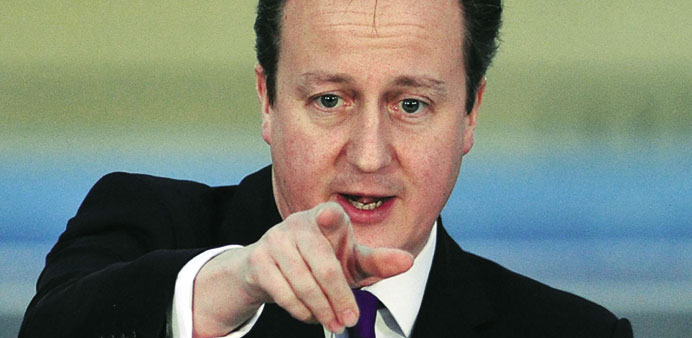Reuters/London
Prime Minister David Cameron torpedoed plans for a series of US-style TV debates before a close-fought national election in Britain, a spoiling tactic widely seen as a move to protect his own high personal ratings and to deprive rivals of publicity.
His intervention injects further uncertainty into what is becoming the most unpredictable British election since the 1970s with neither of the two main parties able to establish a clear lead and the rise of fringe parties making it unusually hard to predict who will govern the world’s sixth largest economy. Britain’s future in the European Union and its territorial integrity could hang on the outcome as Cameron has promised an EU membership referendum if he wins and an ‘out’ vote would prompt another Scottish push to leave the United Kingdom.
Cameron blamed broadcasters for what he said were chaotic preparations for three debates planned before the May 7 election, saying he would only take part in one debate next month if it included the leaders of six other parties, most of them minor.
“This is our final offer, and to be clear ... the prime minister will not be participating in more than one debate,” Craig Oliver, Cameron’s communications chief, told broadcasters, prompting rivals to accuse the leader of cowardice. Neck-and-neck with the opposition Labour Party in many opinion polls, Cameron has long said he doesn’t want to take part in TV debates in the final month of campaigning, arguing they would be an unhelpful distraction.
His rejection of broadcasters’ proposals to hold several debates ends months of prevarication over the issue however and kills off the idea of a head-to-head debate with Ed Miliband, the Labour leader and Cameron’s main rival to be the next prime minister. Miliband said Cameron was running scared.
“David Cameron is ducking the debate with me,” Miliband told British TV. “He is cowering from the public. I’ll debate him any time, any place, any where.” Memories of the last pre-election TV debates - in 2010 - loom large in Cameron’s thinking.
Watched by 22mn people, they transformed that election, boosting the centre-left Liberal Democrats and depriving Cameron of an overall majority.
Cameron has been forced to govern in a two-party coalition with the Liberal Democrats ever since, an arrangement that has stuck in the craw of many of his lawmakers who argue that their plans to reform Britain have been watered down as a result.“They had huge audiences and they made a difference,” YouGov pollster Peter Kellner said of the 2010 debates.
“The Liberal Democrats held on to enough of their gains (from the debates) to stop the Conservatives winning outright,” he told the BBC.

